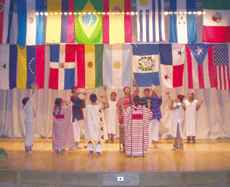On the first anniversary of September 11, a ceremony entitled “Memorial of Hope” was held in the Ryan Lounge.
Against a spectacular view of the Boston Harbor, Stephanie Janey, Dean of Students, welcomed the many students and faculty who were in attendance.
Janey reminded this body that four students and faculty members from UMass experienced the death of an immediate family member in the attacks. Fittingly, Reverend Adrienne, the Protestant chaplain at UMass, then took to the podium and offered a prayer. “To Lord God, whom we call by so many names,” for the many lives touched by the tragedy.
After the prayer, Chancellor Gora made a short speech, saying “…we came together, not to forget, but to feel the strength and solidarity of our community and as a nation.” She emphasized the importance of freedom and family, how neither can be taken for granted. Next was a long, heavy moment of silence for people to “use in whatever way” they chose to remember the victims of violence.
Everyone was then urged to stand up and sing “Let There Be Peace On Earth,” the words of which were printed on the programs handed out before the ceremony. The audience made a beautiful vocal contribution to the event in this way. Two students, both Golden Key Club members, Esther Smith and Omar Bukhari offered their reflections on 9/11 after the song was over.
Smith remembered how she wondered what was happening to the world when she heard the news last year after physics class. In her remarks, she mused as to whether “in the name of protecting national security, we have become devoid of individual freedoms.”
Bukhari relayed his first glimpse of the Twin Towers, one that many students and faculty shared with him that day, as he watched the events unfold on the television in front of the campus’ bookstore. He said of his feeling of helplessness, “As I stood watching [the TV] in front of the bookstore, I witnessed one of the worst forms of human massacre, and there was nothing I could do about it.”
Bukhari described the alienation and discrimination he experienced after the attacks as a Muslim American. But he explained that, he too, was in pain like all Americans were. “The grief,” he said, “and the anguish that we [Muslims] went through was no different from anyone else. Because no matter who the victims were, they were one of us, irrespective of religion.”
The keynote speaker, Virginia Straus, is the executive director of the Boston Research Center for the Twenty-First Century, an international peace and justice institute of Buddhist traditions. In her address, she immediately took an interesting track in reflecting on the title of the event, “Memorial of Hope,” seeing a less common meaning in it.
Straus discussed “the death of a certain kind of hope…the hope that we can go on living an unsustainable lifestyle and feeling safe in our way of life, go on pursuing the policies, especially the foreign policies, that keep this lifestyle intact without regards to the suffering and possible hardship people are experiencing in other places because of the very global system we rely on.” Our task, she said, is to dig deeper and find the right kind of hope, one that is more reassuring than politicians and artillery: our inner selves.
She had the audience close their eyes to search for a place of inner peace, then a place of conflict and anxiety, and finally back to the place of inner peace. While the audience was “there,” she asked them about how it would be to shape all of their thoughts and deeds from this place of calm. This place is the start of the dynamic process of peace, she explains, which begins with individual change, the change of consciousness, and moves outward to incite profound transformations in cultural practices and values.
“As our way of life changes, so do the policies and views of the people we elect as our political leaders,” she concluded. “This is truly the people power in a democratic age, the power to create a culture of peace.”





















































